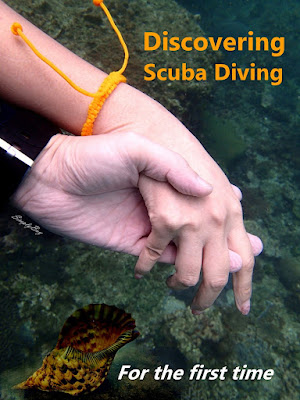The aim of this experience is to get you into the water as soon as possible. Many people would have thought it's cumbersome to take the Open Water diving course but still felt like trying it the easier way to get a taste of seeing the underwater world in real life with your own eyes. Some would still prefer to watch this beautiful underwater world from the comfort of their sofa by tuning into National Discovery Channel.
What does one need to try out scuba diving? Well, the plain answer is sheer bravery and that's what I've been telling. "Is that all you will need?" asked most people when I told them bravery is all that's needed. They are always hesitant and will say "No, you got to be a good swimmer in order to do scuba". The real fact is that discovery scuba diving program such as this does not require you to know how to swim at all. For instance on one diving trip, a lady who doesn't have a single clue about swimming went ahead to get this experience. Astonishing isn't it?
The most important thing to do is to sleep well and eat well. Most dive spots around the world are located nearby the sea and you can get plenty of seafood. Enjoy a relaxing time while doing your search for a dive center which offers this kind of scuba discovery experience.
Your Freedom to Explore 70% of This Earth
While this not the actual scuba certification, during a scuba discovery program you'll learn how to use scuba equipment in shallow water and get a quick and easy intro to what it takes to explore the underwater marine world with a dive professional. One thing you'll sure learn is that you really can breath underwater whether you like it or not.
You will also learn what wearing scuba equipment feels like and how easy it is to move around underwater while wearing it and at same time learn some basic skills and safety rules that will carry over to your full scuba certification course if you decides to take the next step. Most first-timer diver would find it very alien to be on board a dive boat seeing all the air tanks, wet suits, buoyancy jackets, breathing regulators, weight belts, mask, fins, etc. What are all these stuff? Don't worry your instructor will brief you what all these equipment are and their applications.
From an interview with a new scuba discovery student, all those equipment when carried on the body felt like a truckload of weights. But no sooner after jumping into the water they are weightless. First-time scuba diver will need to overcome the fear of sinking into the water after jumping down from the boat. You will never sink but instead floating nicely on the water surface.
Learn To Dive
Majority of first-timer would quickly get panic immediately once in the water. Just bear in mind that the Buoyancy control jacket that is fastened to the tank will be filled with air to enable a scuba diver to float. I simply call this buoyancy compensation of your weight by a balloon filled with air to make you float. Relax and don't worry. There's no need to panic and start kicking your fins as this will be a waste of energy. As soon as you're calm, your instructor will show you how to use the breathing regulator and other skills for your first dive ever. Be brave and overcome the fear at the mind door.
There is no coaxing a student to continue further should he/she want to stop the dive. Hence, there's no forcing upon any student to complete the entire scuba discovery program. Simply indicate to the instructor that you wanna stop and you will be up on the surface.
As soon when you are ready, the instructor will release the air on your floating jacket and you will sink down. Always remember to breath air using the breathing regulator from your mouth. The rest along the way is easy under the supervision of a dive professional. Very soon you will find the love and beauty in scuba diving just like many whom had done it.
Students will be taught basic skills like mask clearing as water will likely sip inside and flood your mask causing interrupted vision. The most important skills is to learn to equalize your nose pressure. In scuba diving the deeper you go the more atmospheric pressure will be felt inside your ear drum. This can be corrected by using the correct technique to get you into deeper dive mode. Typically for a try out scuba like this, the max depth level is around 10 meters. Beyond this depth level you will need to take an OW or AOW certification course.
Student divers will get the chance of a lifetime to explore the ocean by direct supervision of a qualified instructor. In many scuba "try out" program will offer at least 2 dives. The first dive is more of getting a student adjusted to the water environment while learning some basic scuba skills.
Discovering scuba diving for the first time isn't that bad after all. The video you see here is a first-time adventurer being guided by a qualified instructor to explore the shallow dive during the 1st dive. After all this is a fun dive and all you need to do is to relax and enjoy the experience.
At the bottom of the ocean during this shallow dive, you can start seeing the reality of corals and its rich marine life at 5 meters depth. Snorkeling may not be able to bring you this close. As the scuba diving goes deeper at 8-10 meters depth, the video below shows the actual scenery at this shallow dive for the scuba diving adventure.
Actual footage of what you will encounter during your first dive
Open water divers can be seen lingering at lower depth exploring the ocean floor and corals to see different marine life. As an adventure seeker in Discovery Scuba program you will stay at shallower water.
The air tank will have its limitation as to so much air we could carry it to breath underwater. Once the submersible pressure gauge hits 50 Bar, it is the end of the dive and everybody will gradually surface up and to tell their tales of what they saw during that dive i.e. turtles, sharks, parrot fish, sea horses, etc.
At the end of the dive, students will normally receive a certificate for their bravery in taking their first step to discover scuba techniques and see the aquatic life with your own eyes in HD format. With this first-hand experience, the lasting memories of this dive adventure will surely mesmerize your senses whenever you recall the beautiful marine atmosphere.
After trying the first scuba diving, the memorable experience may last for the rest of your life as a marine adventurer who dared to traverse 70% of the ocean on this earth. May this true story serve as a good source of inspiration for those who wanted to get a taste of scuba diving in the real ocean. Learn to dive to enjoy the serenity of the underwater world first-hand or tune into National Discovery Channel.
Next Article Story
Ocean Dive Part 1
Ocean Dive Part 2



































































